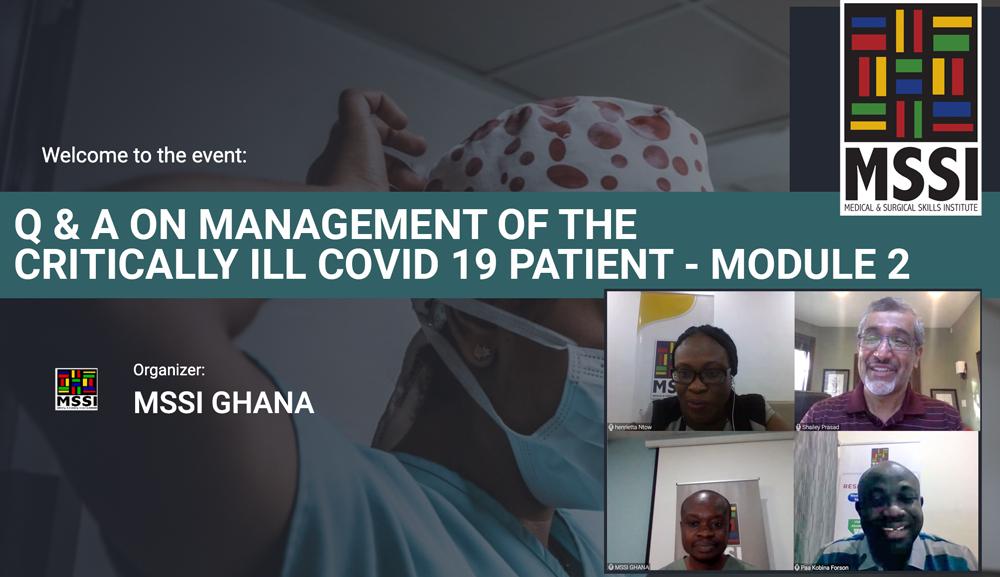Medical and Surgical Skills Institute Partnership
Partnering to build the capacity for online medical education and training for health professionals in West Africa
Since early 2020, CGHSR has partnered with the Medical and Surgical Skills Institute (MSSI) in Ghana to facilitate global capacity building activities. The MSSI is a health training center that provides medical and surgical skills training to advance health care in West Africa. In the face of the COVID-19 pandemic, MSSI has been pivoting their work to online training and activities in order to continuing bringing their expertise to Ghanaian health professionals.
MSSI PARTNERSHIP SPOTLIGHT
Building eLearning Capacity: UMN partners with Ghana NGO to deliver online COVID-19 training
The MSSI has been encouraged to disseminate training that will prepare Ghanian and West African health care providers to treat patients afflicted with COVID-19. Last July, MSSI and CGHSR joined together to adapt course content for online platforms, train course facilitators to lead courses, and deliver live and recorded webinars. Learn more about the partnership

Project Goals
At the request of the Ghana government and West African College of Surgeons, the MSSI was initially encouraged to disseminate training that will prepare Ghanian and West African health care providers to treat patients afflicted with COVID-19. After a successful initial partnership, CGHSR and MSSI continued to collaborate on online education and training on various health topics.

“What makes the UMN/MSSI partnership so very special is the humble manner and the cultural sensitivity of the UMN team. They did not come in with an agenda. Instead, they spent a lot of time getting to know the MSSI team. After developing this relationship, the UMN team listened to the MSSI in order to understand our skills and capabilities."
Myron Aldrink, MSSI board chair
Key Activities
- Presentations for eLearning and Webinars: Led by CGHSR and the Center for Animal Health and Food Safety, the UMN team demonstrated practical adjustments to online presentations that promote learning and retention of knowledge and skills to 40 MSSI instructors.
- Obstetric Fistula Panel Discussion: Rahel Nardos, MD, MCR, partnered with MSSI to co-host a two-day long virtual panel discussion and training on obstetric fistula for midwives, doctors, and community health workers in Ghana.
- Diabetic Retinopathy: Five Rules to Follow to Prevent Blindness in Diabetics: University of Minnesota Medical School professor Hossein Nazari, MD, led a two-day training on diabetic retinopathy, a topic that is vital and underserved in the West African region.
- Q&A on Management of the Critically Ill COVID-19 Patient: CGHSR director Shailey Prasad, MD, MPH, moderated a panel discussion along with Ghanaian emergency doctors and nurses to provide an overview of COVID-19 and the situation in Ghana.

“The relationship with the University of Minnesota has brought out the best in the MSSI team. The UMN team never comes to the discussion table with already carved out solutions, but are always ready to listen, tease out challenges, and help come up with solutions to our training needs whilst taking in technological and supply limitations and socio-cultural considerations.”
Kwame Agyire, MSSI executive director

MSSI Impact: 2020
Since the start of the partnership between MSSI and CGHSR, the Institute has utilized eLearning best practices to increase their reach and the impact of their trainings. In 2020 the MSSI saw:
- 90 courses delivered – 55 online and 35 in-person
- 26,513 professionals trained – 24,964 online and 1,549 in-person
- 5,117 professionals trained on COVID-19 related topics – such as basic public health, contact tracing, early detection of COVID-19, and pre-hospital care practices